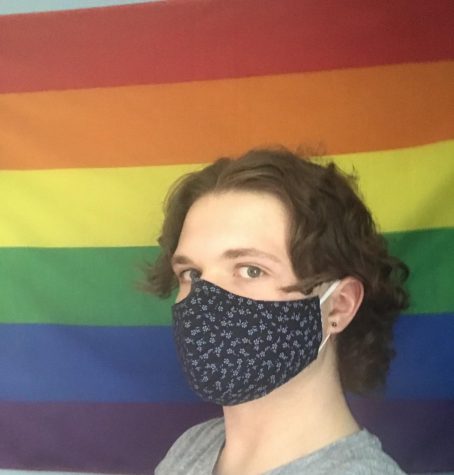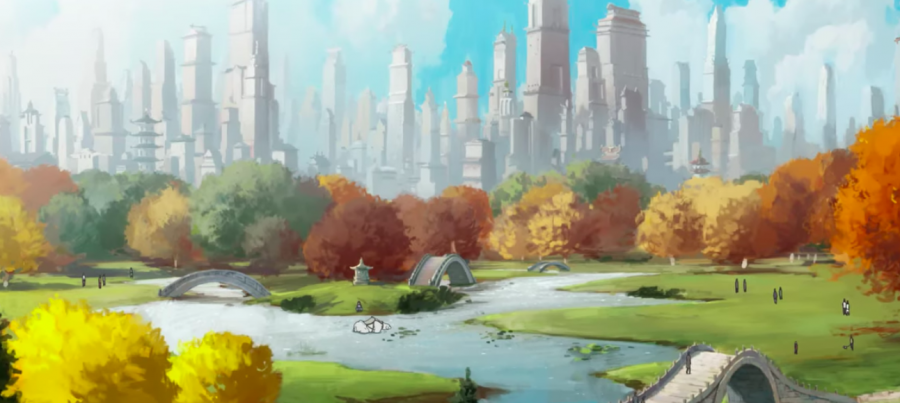The Reactionary Politics of ‘The Legend of Korra’
“The sequel is set a hundred years later, in the unsubtly named “Republic City.” The city is afflicted with two existential threats–organized crime and radical insurrectionism–the twin bogeymen of conservatism.”
The Legend of Korra (2012-2014) is the long-awaited and extraordinarily divisive sequel to the classic Nickelodeon series Avatar: The Last Airbender.
Critics of Korra often cite the vapidity of the protagonist’s character, the comparatively joyless tone of the sequel series, and the meandering trajectory of the plot as the prime failings of the series.
Political critiques of the series are less prevalent in the fan community–which is surprising, because the overall plot of Korra, specifically that of the first season, reads like a time-travelling joint-venture between Ayn Rand, Joseph Goebbels and Tucker Carlson.
One may inquire as to the efficacy of questioning the politics of a show aimed at children (why not apply critical race theory to Peppa Pig, while we’re at it?).
We must, however, be conscious of the profound impact television can have on the political socialization of the children who consume it. The reactionary messages in Korra stand out because the original Avatar series seemed very conscious of its sociopolitical footprint.
Avatar: The Last Airbender marries leftist political ideology to its themes of purpose and identity in a way that is both sophisticated and elegant. In a language children can understand, Avatar teaches its audience of the nefarious power of propaganda, the existence of institutionalized patriarchy, the way oppressive and exploitative imperialism can be marketed as humanitarian intervention, how industrialization can hurt communities more than it helps then, how the demand for weapons perverts the course of science and how prisons are used to perpetuate oppression rather than reduce crime.
In an earlier episode, the protagonists liberate an internment camp built by the fascist “Fire Nation” to consolidate their power over a colonial property. And towards the end of the series, Zuko, a prince of the Fire Nation who comes to join the protagonists in their war against it, laments, “Growing up we were taught that the Fire Nation was the greatest civilization in history.
And somehow, the war was our way of sharing our greatness with the rest of the world.” This denunciation of imperialism is so effective and so, for lack of a better word, revolutionary, that it instantly manages to surpass most media created for adults.
It is unsurprising that Avatar Kyoshi has joined the likes of “ACAB Manny” as a surrogate-symbol of the #BlackLivesMatter movement. Avatar is a special show, in no small part because of its profound progressive themes.
Korra abandons the themes of Avatar. The sequel is set a hundred years later, in the unsubtly named “Republic City.” The city is afflicted with two existential threats–organized crime and radical insurrectionism–the twin bogeymen of conservatism. The main antagonists of the first season are “the equalists”, shoddy caricatures of left-wing activists.
These “equalists” believe that benders (people in the Avatar universe who exhibit certain spiritual and physical powers) oppress non-benders with their magical abilities. For this reason, the equalists, led by a shadowy figure named “Amon,” seek to take away the benders’ abilities, rendering everyone truly “equal.”
The parallel to real-life Marxists and socialists is hammered home by their red-and-yellow posters, which are meant to resemble Mao-era state propaganda.
It is easy to see the problem with depicting the fight for equality as something radical and destructive. In the equalists’ desire to strip away the bending of the institutionally privileged elements of the Avatar universe, we can see a clear parallel to real-life discussions about the redistribution of wealth and the coordinated attempts to undermine privilege in our own communities. In doing so, Avatar frames progress as not only something sinister, but as an attack on the identity and autonomy of the privileged.
The characters who “lose their bending” in the series are depicted as shell-shocked husks of their former selves. According to Korra, fighting against privilege is tantamount to dehumanizing and mutilating the privileged.
The truly tragic thing is, there is potential for a nuanced and mature political discussion in this premise (you know, like in the original Avatar). Certain details about Republic City make the equalists’ allegations of discrimination feel pretty valid.
The entire police force of Republic City is made up of metalbenders. The highest-billed sporting event, “professional bending,” by its very nature bars non-benders from participating. And while it is called Republic City, the republic is truly somewhat of a theocratic oligarchy, with Tenzin (the son of Avatar Aang from the original series) owing his seat on the “United Republic Council” to his position in the Air Temple.
The world that Korra introduces could use a serious discussion about the secondary role of non-bending citizens — seeing as certain benders can fly, are there buildings that are only accessible to benders? Do benders enjoy better access to education through the monastic organizations that recruit and train them?
The show flirts with this sort of commentary: in one episode, the Council implements a curfew over non-benders in order to crack down on the equalists. When a group of non-benders gather to protest this oppressive curfew, law enforcement labels them as equalists, and arrests them all.
However, for the majority of the season, the equalists are nothing more than annoying, whiny zealots. When she first meets an equalist, the protagonist Korra insists that they are “just oppressing themselves” — that is, manufacturing a false narrative of victimhood for political profit.
In a later scene, Korra apprehends that same equalist, demanding under threat of force that they tell her where the equalists are meeting. This scene, with a self-appointed vigilante threatening an activist with violence, seems particularly unsettling in a post-Kenosha world.
The few equalists who explain their motivations for joining the movement always have some ulterior motive. Hiroshi Sato, an industrialist who joins the equalists, joins because his mother was killed by the Agni Kai Triad — his motivation doesn’t concern his political ideology, it is just born out of a prejudice against all benders.
The season truly goes off the rails when it is revealed that Amon, the leader of the equalists, is the son of a blood-bending mass-murderer named Yakone — and, thus, also a bender. This twist is vapid and contrived for a variety of narrative reasons.
Yakone, whose career is sandwiched between the two series, is only developed in flashbacks that serve as transparent intended foreshadowing. Also, it is first revealed that another character, Tarrlok (a rival legislator on Tenzin’s Council), is the son of Yakone — and later Tarrlock reveals that Amon is his brother, even though it is never foreshadowed that Tarrlock ever had a brother.
From there, it falls upon the protagonists to expose Amon as a bender in front of the equalists. Once his secret is found out, his followers abandon him, apparently instantly and simultaneously recanting their belief that they are victims of discrimination.
This is probably the most offensive and politically irresponsible message in this mess of a season.
All oppressive institutions try to deny the existence of a spontaneous opposition to their policies, because if there exists actual unrest, there must be institutional cause for that unrest. Thus, reactionaries seek to paint the opposition as something artificially provoked as part of a disingenuous false-flag campaign.
There’s nothing actually wrong with the system, but someone is trying to convince you that there is.
In 1919, when the lynchings of black Americans precipitated massive protests in several US cities, the press and government blamed anarchist and communist provocateurs for the social unrest, dubbing the period “Red Summer.”
The Nazis, in one of their most effective propaganda campaigns, introduced the theory of “cultural bolshevism,” blaming Communism on a conspiracy of Jewish intellectuals hell-bent on destroying the international economy.
In the modern day, our incumbent president, in his 2020 Independence Day speech, blamed the #BlackLivesMatter protests on, “the Marxists, the anarchists, the agitators, the looters and people who in many instances have absolutely no clue what they are doing”. Because there is never anything wrong with the system — it’s all just the fault of some disingenuous mastermind.
I loved the original Avatar the Last Airbender — for its characters, its sense of humor, and its gripping narrative — but also for its profound, uplifting sociopolitical message. Avatar insists that people, whether through fate, or through hard work, or through introspection, can gain the power to topple existing economic hierarchies, free the subjugated, and defeat imperialism. So forgive me, if, after The Legend of Korra told me that the system is fine just the way it is, I couldn’t keep watching.

Alice Soprunova (she/her) began writing for the Beachcomber in 2019. She covers stories pertaining to issues of social justice inside and outside BHS....












pants briskley • Dec 30, 2021 at 10:55 AM
This article is really combining a lot of my interests gotta say – thanks for writing it!
I’m still slowly watching the series but I sought out this article by searching something like “idealogical flip-flop avatar korra.” It’s hard to believe that both shows had the same creators – it was a jarring experience to go from one to the other.
Lordyam • Dec 16, 2021 at 9:18 PM
Except that bending isn’t economic privilege. It’s a physical part. Removing it is like taking away a painter’s ability to paint or a writers ability to write. So no by any logical standard Amon was going to far. That’s not economic distribution.
Amon’s hatred of bending is also shown to derive from his guilt over failing to save Tarlokk
MayD • Feb 28, 2022 at 8:42 PM
That’s… the point? The sequel’s antagonist styled themselves as an equalist and wants to take away people’s bending so none has.. too much power when h rules? Because his father abused them? And somehow that’s Marxism, when the ideology has more nuance than that.
If the show really wants to critique marxism, at least provide an actual critique of the ideology as it was laid out in books and practice by communist revolutionaries. No, instead we get the same old “nOoOo MaRxIsM tAkEs AwAy YoUr StUfF!1!” and that’s no different than parroting “sOcIaLiSm Is WhEn tHe GuhBmEn”.
Zain • Jan 20, 2023 at 1:01 PM
The show was never trying to address Marxism or anything related to that. The whole conflict of the season is based on the Taiping Rebellion, with the Equalists being analogous to the Bai Shangdi Hui.
will chaney • Aug 31, 2021 at 2:25 AM
really great analysis!! this was the 4th or 5th article i found, and none of the other articles saw how legend of korra’s structure is reactionary, or even that anything was lost from last airbender. it is one of the capitalist-racist-patriarchal-imperialist system’s most powerful strategies to capture control over any threatening cultural/artistic movement, or even just one tv show. if the system let avatar continue on the revolutionary path it was going on, it would cause too many problems for the daily reproduction of oppressive social relations. etc etc. keep up the good work of analyzing ideology/culture/society! 😀 solidarity!
Eric Odell • Aug 26, 2021 at 12:49 PM
Fantastic article. Should be reposted on a site with a bigger audience.